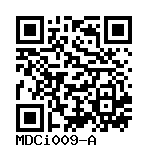8993-C11
MDCi009-A
General
Cell Line |
|
| hPSCreg name | MDCi009-A |
| Cite as: | MDCi009-A (RRID:CVCL_C0HF) |
| Alternative name(s) |
8993-C11
|
| Cell line type | Human induced pluripotent stem cell (hiPSC) |
| Similar lines |
UNIZARi001-A (FiPSTK2-2) Donor's gene variants: TK2, TK2 Donor diseases: Mitochondrial DNA depletion syndrome, myopathic form |
| Last update | 23rd August 2022 |
| User feedback | |
Provider |
|
| Generator | Max Delbrück Center Berlin Buch (MDC) |
| Distributors | |
| Derivation country | Germany |
External Databases |
|
| BioSamples | SAMEA12276589 |
| Cellosaurus | CVCL_C0HF |
| Wikidata | Q112930102 |
General Information |
|
| Publications | |
| * Is the cell line readily obtainable for third parties? |
No |
Donor Information
General Donor Information |
|
| Sex | female |
Phenotype and Disease related information (Donor) |
|
| Diseases | A disease was diagnosed.
|
Karyotyping (Donor) |
|
| Has the donor karyotype been analysed? |
Unknown
|
External Databases (Donor) |
|
| BioSamples | SAMEA12276554 |
Ethics
| Has informed consent been obtained from the donor of the embryo/tissue from which the pluripotent stem cells have been derived? | Yes |
| Was the consent voluntarily given? | Yes |
| Has the donor been informed that participation will not directly influence their personal treatment? | Yes |
| Can you provide us with a copy of the Donor Information Sheet provided to the donor? | Yes |
| Do you (Depositor/Provider) hold the original Donor Consent Form? | Yes |
| Please indicate whether the data associated with the donated material has been pseudonymised or anonymised. | pseudonymised |
| Does consent explicitly allow the derivation of pluripotent stem cells? | Yes |
| Does consent prevent CELLS DERIVED FROM THE DONATED BIOSAMPLE from being made available to researchers anywhere in the world? | Yes |
| How may genetic information associated with the cell line be accessed? | Controlled Access |
| Will the donor expect to receive financial benefit, beyond reasonable expenses, in return for donating the biosample? | No |
| Has a favourable opinion been obtained from a research ethics committee, or other ethics review panel, in relation to the Research Protocol including the consent provisions? | Yes |
| Name of accrediting authority involved? | Ethikausschuss am Campus Virchow-Klinikum |
| Approval number | EA2/131/13 |
| For generation of the cell line, who was the supplier of any recombined DNA vectors or commercial kits used? |
hIPSC Derivation
General |
|
| Source cell type | |
Reprogramming method |
|
| Vector type | Non-integrating |
| Vector | Sendai virus |
| Is reprogramming vector detectable? |
No |
| Methods used |
PCR
|
Vector free reprogramming |
|
Other |
|
| Derived under xeno-free conditions |
Unknown |
| Derived under GMP? |
Unknown |
| Available as clinical grade? |
Unknown |
Culture Conditions
| Surface coating | Matrigel/Geltrex |
| Feeder cells |
No |
| Passage method | Enzymatically |
| O2 Concentration | 5 % |
| CO2 Concentration | 5 % |
| Medium |
Other medium:
Base medium: StemMACS iPS-Brew XF
Main protein source: Serum concentration: % |
| Has Rock inhibitor (Y27632) been used at passage previously with this cell line? | Yes |
| Has Rock inhibitor (Y27632) been used at cryo previously with this cell line? | No |
| Has Rock inhibitor (Y27632) been used at thaw previously with this cell line? | Yes |
Characterisation
Analysis of Undifferentiated Cells
| Marker | Expressed | Immunostaining | RT-PCR | Flow Cytometry | Enzymatic Assay | Expression Profiles |
| TRA 1-60 |
Yes |
|
||||
| NANOG |
Yes |
|
Differentiation Potency
In vitro spontaneous differentiation
| Marker | Expressed |
| SMA |
Yes |
| FN1 |
Yes |
In vitro spontaneous differentiation
| Marker | Expressed |
| PAX6 |
Yes |
| beta-tubulin III (TUJ1) |
Yes |
Microbiology / Virus Screening |
|
| HIV 1 | Negative |
| HIV 2 | Negative |
| Hepatitis B | Negative |
| Hepatitis C | Negative |
| Mycoplasma | Negative |
Genotyping
Karyotyping (Cell Line) |
|
| Has the cell line karyotype been analysed? |
Yes
figure of virtual karyotype
Karyotyping method:
Molecular karyotyping by SNP array
http:// |
Other Genotyping (Cell Line) |
|


Login to share your feedback, experiences or results with the research community.